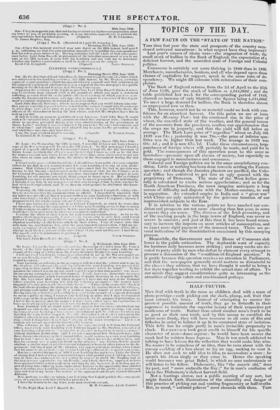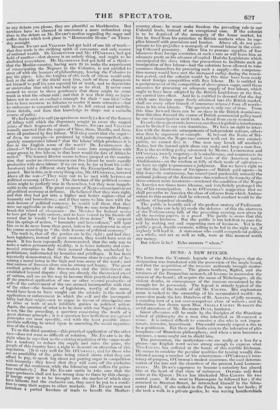HALF-ThuTHS.
MEN deal with truth in the mass as children deal with a mass of plum-porridge—each picking out the sleek, plump, soft fruit that most attracts his fancy. Instead of attempting to master the greatest possible amount of truth, they go to fisticuffs in their eagerness to maintain the superior beauty of their respective pet modicums of trnth. Rather than admit another man's truth to be as good as their own truth, and by this means to establish the latter more firmly, they will have recourse to all sorts of fibs and fallacies in order to holster it up in its unnatural state of isolation. This folly has its origin partly in man's invincible propensity to clack. 13i.rmi.:Nnaen took great credit to himself fbr his specific character of man—bongo sapiens: he would have been nearer the mark had he written 1101110 ?opens. Nan is too much addicted to talking to have leisure for the reflection that would make him wise. No sooner is he conscious of an idea, than he runs about with the uneasy cackling of a hen about to lay an egg, seeking to vent it. He does not seek to add idea to idea, to accumulate a store : he spends his ideas singly as they come in. Hence the speaking world becomes one great Babel, in which no man understands or will listen to his fellow. Dishonesty, like "the anarch old," does its part, and " more embroils the fray ;" for in man's confusion of ideas lies Dishonesty's richest harvest-field.
Not a hustings orator, not a public meeting of any sort, but might furnish forth illustrations of the absurdity and danger of this practice of picking out and venting fragmentary or half-truths. But, as usual, " national palaver" most abounds with them. Turn to any debate you please, they are plentiful as blackberries. But nowhere have we chanced to encounter a more redundant crop than in the debate on Mr. EWART'S motion regarding the sugar and coffee duties which took place in "Honourable House" on Thurs- day scnnight.
)Messrs. EwAUT and VILLIERS had got hold of one bit of truth— that free trade is the vivifying spirit of commerce and only source of national wealth. Dr. LUSHINGTON sad Mr. O'CONNELL had got hold of another—that slavery is an unholy thing, and ought to be abolished everywhere. Mr. GLADSTONE had got hold of a third— that the Mother-country, having seen fit to make the experiment of emancipating the Negroes In the Colonies, is not entitled to strut of with the honours of philanthropy, leaving the Colonies to pay the piper. Like the knights of old, each of whom would only look at the side of the shield next him, each of these champions set himself to puff his own especial bit of truth, and to depreciate or undervalue that which was held up as its rival. It never once seemed to occur to these gentlemen that there might be some truth in what the others said; and that it was their duty as legis- lators not to seek an exclusive triumph for their " one idea"—flir less to have recourse to fallacies to render it more attractive—but to endeavour to comprehend truth in its full extent and multifa- rious details, and from that knowledge to shape out a catholic course of policy.
We feel tempted to cull (as specimens merely) a few of the flowers of flillacy with which the disputants sought to cover the ragged joints of their fragments of truth. Alessrs. Ewairr and VILLIERS roundly asserted that the sugars of China, Siam, Manilla, and Java, were all produced by free labour. Will they assert that the sugar— of Java, for example—is produced by totally uncompelled, ade- quately remunerated labour ? that the labour which produces it is free in the English sense of the word ? Dr. Lustursoms de-
clared—" When foreign sugar should come into competition with sugar grown by free labour, in that hour would the fate of Africa be wild." The learned Doctor seems to have jumped at the conclu- sion that under no circumstances can free labour be made equally productive with slave labour: if we err not, he (or at least Iris eulla- borateurs) told a different story before the Emancipation Act was passed. But in this, as in every thing else, Mr. O'CoNNELL, towered above all the rest—" They were not to be met with lectures on political economy. (Cheers) The doctrines of the political econo- mists might be perfectly true in themselves, but they were inappli- cable to the subject. The great measure of Negro-emancipation set all political economy at defiance. Ile believed that they were right, and that they had got into a higher and better region—that of humanity and benevolence ; and if they came to him now with the stale lessons of political economy, he would tell them that they were not applicable to the subject." This we may term the Donny- brook-fitir school of 'eloquence : the Member for Ireland seems to have got tipsy with oratory, and to have vowed to his friends all round that he would " for love knock them down." We suspect that his springs of action, " humanity and benevolence," will spur him on to do more harm than good, unless be condescend to steer his course according to " the stale lessons of political economy."
The truth is, that all the parties arc in the right ; and had they or been legislators, instead of mere orators, they would have seen as much. It has been repeatedly demonstrated, that the only way to make a nation permanently wealthy, is to leave industry and com- mercial enterprise to find their natural channels, unchecked by prohibitions, undistracted by bounties and privileges. It has been repeatedly demonstrated, that the freeman alone is capable of be- coming a moral being in the high and true sense of the word ; and that nations of freemen alone can be strong and happy. The great cardinal principles of the free-traders and the anti-slavers are established beyond dispute : they are already the theoretical creed of nations, and are on the way to become their practical creed also. If the practical application of one or other seemed productive of evil—if the enforcement of the one seemed incompatible with that of the other—the business of legislators, worthy of the mune, would have been to have sought out the mistake in the mode of application or enforcement in which the evil and the incompati- bility had their origin—not to argue in favour of abandoning one or other or both of such infallible guides in political action. Again, the question of what is to he done with our Sugar Colonies, is not, like the preceding, a question concerning the truth of a great abstract principle ; it is a question how both these recognized principles can most speedily, and with the least possible inter- mediate suffering, be acted upon in amending the social organiza- tion of the Colonies.
To us this third question—this practical application of the other two—does not seem so difficult of solution. Mr. Etyma is in the right when he says that as the existing regulation of the sugar-trade has a tendency to reduce the supply and raise the price, the people of this country have a right to demand an alteration of this regulation. [It is very well for Mr. O'Coss rasa., and for those who See 110 possibility of the price being raised above what they can afford to pay, to speak big about not putting sugar in competition with humanity: they know that that' will carry off the exclusive honour of the sentiment, while the labouring man suffers the priva- tion exclusively.] But Mr. EWART Omits to take care that the sugar-producers shall not have wrong done to them by this change. If foreign sugar is to be brought into the market of which they have hitherto had the exclusive use, they must be put in a condi- tion to carry their sugars to other markets. Mr. EWART must not introduce a partial freedom of trade to benefit the Mother-
country alone: he must make freedom the pervading rule in our Colonial trade, instead of an exceptional case. If the colonist is to be deprived of the monopoly of the home market, let him be freed from his astriction to British markets when he sup- plies himself with provisions and lumber. Above all, do not per- petuate to his prejudice a monopoly of manual labour in the exist- ing Coloured peasantry. Allow him to procure supplies of free labourers from foreign countries, at such a rate as will leave him an adequate profit on his advance of capital. Had the Legislature which emancipated the slave taken due precautions to facilitate such an immigration of free labour—had the colonists been allowed to take measures themselves for procuring such a supply—the compensa- tion-money would have met the increased outlay during the transi- tion period, and the colonist would by this time have been ready to meet foreign competition with free labour. He is entitled to a postponement of the competition of slave-grown sugar, until these measures for procuring an adequate supply of free labour, which ought to have been adopted by the British Legislature at the first, are carried into effect. And he is entitled to demand that the day which sees foreign sugar freely admitted into the British market, shall see every other branch of commerce released from all restric- tions in his own islands. The question is only one of time. From this time forward there can be no slave in the British dominions; from this time forward the course of British commercial policy must be one of emancipation until trade is freed from every restraint. Even for these great ends, however, our direct legislative interference must be limited to our own dominions. We have no right to inter- fere with the domestic arrangements of independent nations, other- wise than by argument or example. If, beyond the limits of Bri- tish jurisdiction, the Negro race cannot work out its own emanci- pation, we cannot free it. One man may knock off another's
chains, but the inward spirit alone can make and keep a man free. Nor is the meddling policy advocated by Messrs. LUSIIINGTON and
O'Coxxxia, merely nugatory—it is mischievous, and counteracts its
own wishes. On the good or bad taste of the American native Abolitionists—on the wisdom or folly of their mode of agitation—
we have no right to pronounce a judgment. But we have a right to say that the interference. of foreigners—of British paid agents—in that domestic controversy, has roused (and pardonably roused) the national jealousy of the Americans—has rendered the tenacity of the slave-owners more inveterate—rendered the condition of the Negro in America ten times more irksome, and indefinitely prolonged the day of his emancipation. As to O'Cosxm.i.'s suggestion that we shall prescribe to America the class of citizens from which Ambas- sadors to this country shall be selected, such conduct would be the sublime of impudent absurdity.
The public is heartily sick of the profuse oratory of Parliament. Nobody (who can help it) reads the debates : of this the abstracts of the Parliamentary talk of the preceding evening, now given by all the morning papers, is a proof The public is aware that this talk hinders business. But the public is too indolent to cure the evil by seeking out and supporting men of business. Yet is the public a good, ductile creature, willing to be led in the right way, if anybody will lead it. A statesman who could comprehend politics as a whole, and act as well as talk, were at this moment worth any money.
But where is he? Echo answers " where."



























 Previous page
Previous page